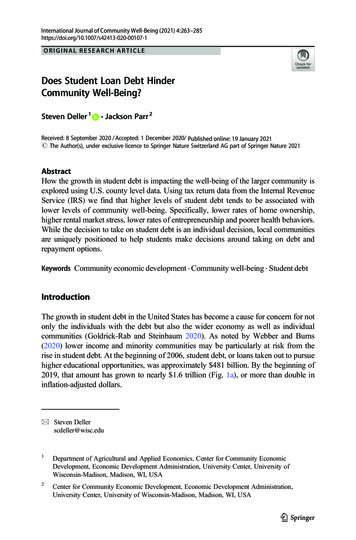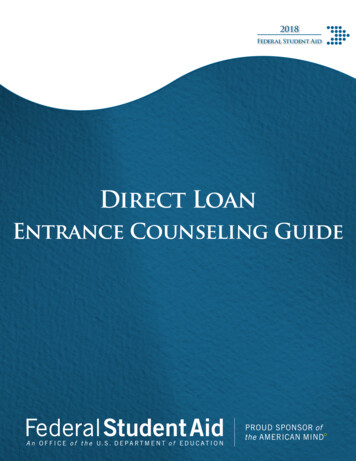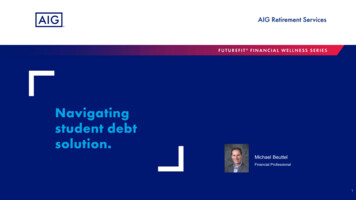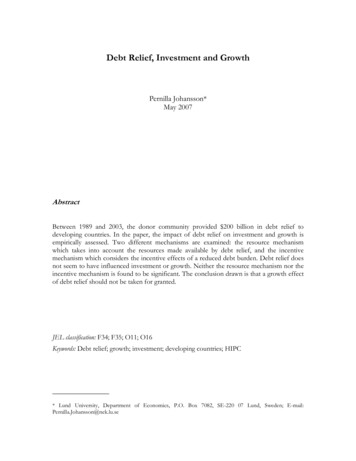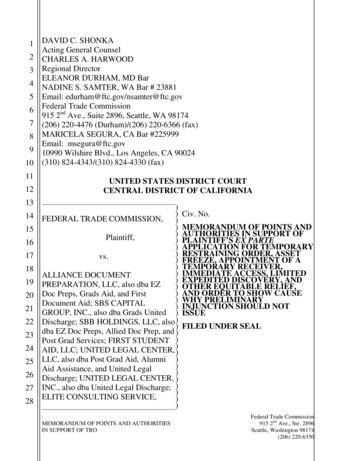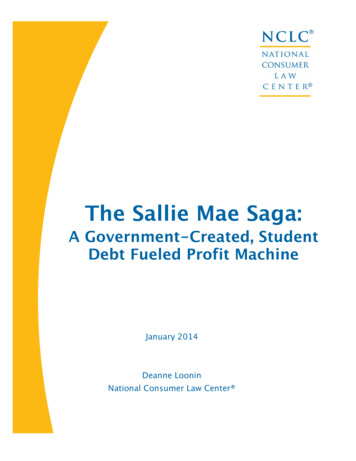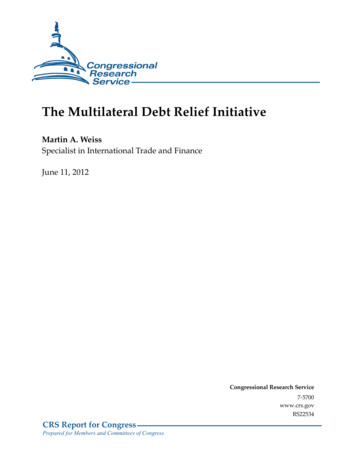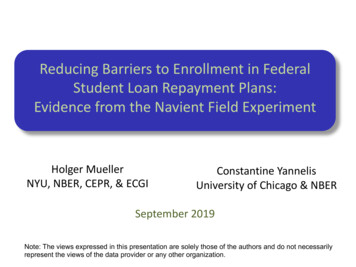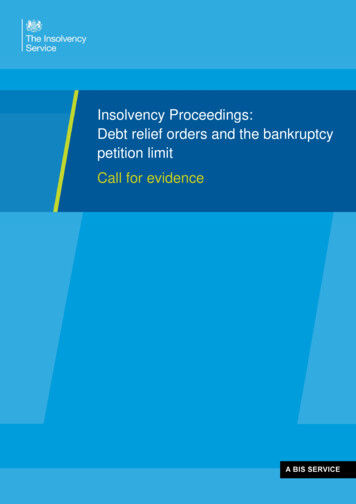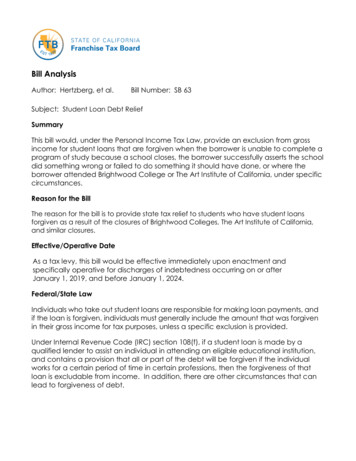
Transcription
Bill AnalysisAuthor: Hertzberg, et al.Bill Number: SB 63Subject: Student Loan Debt ReliefSummaryThis bill would, under the Personal Income Tax Law, provide an exclusion from grossincome for student loans that are forgiven when the borrower is unable to complete aprogram of study because a school closes, the borrower successfully asserts the schooldid something wrong or failed to do something it should have done, or where theborrower attended Brightwood College or The Art Institute of California, under specificcircumstances.Reason for the BillThe reason for the bill is to provide state tax relief to students who have student loansforgiven as a result of the closures of Brightwood Colleges, The Art Institute of California,and similar closures.Effective/Operative DateAs a tax levy, this bill would be effective immediately upon enactment andspecifically operative for discharges of indebtedness occurring on or afterJanuary 1, 2019, and before January 1, 2024.Federal/State LawIndividuals who take out student loans are responsible for making loan payments, andif the loan is forgiven, individuals must generally include the amount that was forgivenin their gross income for tax purposes, unless a specific exclusion is provided.Under Internal Revenue Code (IRC) section 108(f), if a student loan is made by aqualified lender to assist an individual in attending an eligible educational institution,and contains a provision that all or part of the debt will be forgiven if the individualworks for a certain period of time in certain professions, then the forgiveness of thatloan is excludable from income. In addition, there are other circumstances that canlead to forgiveness of debt.
Bill AnalysisBill Number: SB 63Author: Hertzberg, et al.IRC section 108(f) also provides an income exclusion for amounts received under theNational Health Service Corps loan repayment program or certain state loanforgiveness and repayment programs that are intended to provide for the increasedavailability of health care services in underserved or health professional shortage areas(as determined by the state).Federal Student Aid, an Office of the United States (U.S.) Department of Education,has a program that forgives student loans in a limited number of circumstances, 1including what’s referred to as a closed school discharge, which means a studentloan may be forgiven if a student’s school closes while they’re enrolled and thestudent cannot complete their program of study because of the closure, or if astudent withdraws from the school within 120 days of the school’s closure. However,there is no specific exclusion from income for such forgiveness, meaning student loansthat are forgiven as a result of a school closure are generally includable in theborrower’s income.2California allows an exclusion from gross income for student loan debt that iscancelled or repaid under the income-based repayment programs administered bythe U.S. Department of Education.3 This exclusion applies to discharges ofindebtedness occurring on or after January 1, 2014, and before January 1, 2022.In addition, California allows an exclusion from gross income for discharges ofindebtedness occurring on or after January 1, 2015, and before January 1, 2020, thatwould otherwise result from a student loan forgiven as a result of the closure ofCorinthian Colleges and similar closures,4 or the student successfully asserts that theschool did something wrong or failed to do something that it should have done.This BillThis bill would, for taxable years beginning on and after January 1, 2019, and beforeJanuary 1, 2024, provide an exclusion from California gross income for income thatwould otherwise result from the discharge of a student loan of an eligible individual.A student loan would mean any student obligation note or other debt evidencing aloan to any individual for the purpose of attending a for-profit higher educationcompany or for the purpose of consolidating or refinancing a loan used to attend afor-profit higher education company, which is either a guaranteed student loan, anOther circumstances in which a student loan may be forgiven include a total and permanent disabilitydischarge, a death discharge, and a false certification of student eligibility or unauthorized paymentdischarge.2 Insolvent individuals may exclude from gross income forgiven student loans to the extent of theirinsolvency. IRC section 108(a)(1)(B).3 Revenue and Taxation Code (R&TC) section 17132.11.4 R&TC section 17144.7.1Page 2
Bill AnalysisBill Number: SB 63Author: Hertzberg, et al.educational loan, or a loan eligible for consolidation or refinancing under Part B of TitleIV of the Higher Education Act of 1965, as amended (20 U.S.C. Sec. 1071 et seq.).An individual would be eligible for the exclusion for a taxable year if any of thefollowing apply during the taxable year, the individual: Is granted a discharge of any student loan pursuant to:o Subdivision (c) of Section 685.206 of Title 34 of the Code of FederalRegulations (CFR), as it read January 1, 2019, because the individualsuccessfully asserts that the school did something wrong or failed to dosomething that it should have done; oro Paragraph (1) of subdivision (a) of Section 685.214 of Title 34 of the CFR, asit read January 1, 2019, because the individual could not complete aprogram of study due to the school closing. Attended a Brightwood College school on or before December 5, 2018, and isgranted a discharge of any student loan made in connection with attendingthat school that is otherwise ineligible for discharge under provisions of the bill. Attended a location of The Art Institute of California and is granted a dischargeof any student loan made in connection with attending that school that isotherwise ineligible for discharge under provisions of the bill.Uncodified language requires the Legislative Analyst's Office (LAO) to prepare andmake available a report on the effectiveness of this tax exclusion. In addition, forpurposes of this reporting, the LAO may request any data from the Franchise Tax Board(FTB), and the FTB must provide the requested data to the extent currently allowedpursuant to the R&TC.This bill would remain in effect until December 1, 2024, and be repealed as of thatdate.Legislative HistoryAB 461 (Muratsuchi, Chapter 525, Statutes of 2017), for taxable years beginning on or afterJanuary 1, 2017, and before January 1, 2022, excludes from gross income student loandebt that is forgiven or repaid under the income-based and other repayment programsadministered by the U.S. Department of Education.SB 150 (Nguyen, et al., Chapter 650, Statutes of 2015) excludes from gross income severaltypes of student loan debt that is discharged on or after January 1, 2015, and beforeJanuary 1, 2020, including debt that is discharged, pursuant to discharge agreementsbetween certain schools that closed, or other situations in which a student could notcomplete a program of study due to a school closing or doing something wrong.AB 1055 (Baker, et al., 2015/2016) would have provided an exclusion from gross income forstudent loans that were forgiven when the borrower was blind or disabled. AB 1055 failedto pass by the constitutional deadline.Page 3
Bill AnalysisBill Number: SB 63Author: Hertzberg, et al.SB 1271 (Evans & Leno, Chapter 841, Statutes of 2014), for taxable years beginning on orafter January 1, 2014, excludes from gross income student loan debt that is forgiven orrepaid under the income-based repayment programs administered by theU.S. Department of Education.Other States’ InformationThe states surveyed include Florida, Illinois, Massachusetts, Michigan, Minnesota, andNew York. These states were selected due to their similarities to California's economy,business entity types, and tax laws. Florida does not impose a personal income tax,thus a comparison to Florida is not applicable. A review of the remaining states’ lawsfound that none provide an exclusion from gross income for income resulting from astudent loan forgiven because a school closes or does something wrong.Fiscal ImpactThis bill would not significantly impact the department’s costs.Economic ImpactRevenue EstimateThis bill would result in the following revenue loss:Estimated Revenue Impact of SB 63Assumed Enactment after June 30, 2019Fiscal YearRevenue2019-2020- 450,0002020-2021- 500,0002021-2022- 300,000This analysis does not account for changes in employment, personal income, or grossstate product that could result from this bill or for the net final payment method ofaccrual.Revenue DiscussionBased on data from the Department of Education and other research, it is estimatedthat California borrowers would have approximately 25 million of student loansforgiven in 2019 because a school closes or the borrower successfully asserts theschool did something wrong.Page 4
Bill AnalysisBill Number: SB 63Author: Hertzberg, et al.Because California law currently allows an exclusion from gross income for dischargesof indebtedness occurring on or after January 1, 2015, and before January 1, 2020, it isestimated that eight percent of the 2019 discharges would be subject to the provisionsof this proposal and the remainder would be excluded under current law.It is estimated that 20 percent of those forgiven student loans would be attributable toborrowers who are insolvent, thus excludable from income under current law. Of theremaining forgiven student loans, it is assumed that borrowers eligible for this bill’sexclusion would have an average tax rate of 3 percent, resulting in an estimated 50,000 revenue loss for the 2019 tax year,5 increasing to 700,000 in the 2020 tax yearand decreasing each year thereafter.The tax year estimates are then converted to fiscal years and rounded to arrive at theamounts shown in the above eYes VotesNo VotesSeptember 10, 2019400Assembly FloorSeptember 9, 2019790Senate FloorMay 23, 2019380If there are subsequent closures of larger schools that impact borrowers in this state beforeJanuary 1, 2024, this bill could result in substantial additional revenue losses as a result of such closures.5Page 5
Legislative Staff ContactContactJulie LeeActing Agency SecretaryChristina SpagnoliDeputy Secretary, LegislationSelvi StanislausExecutive Officer, FTBJahna CarlsonAsst. Legislative Director, FTBWork(916) 651-9011(916) 651-9373(916) 845-4543(916) 845-5386
borrower attended Brightwood College or The Art Institute of California, under specific circumstances. Reason for the Bill . The reason for the bill is to provide state tax relief to students who have student loans forgiven as a result of the closures of Brightwood Colleges, The Art Institute of California, and similar closures.
